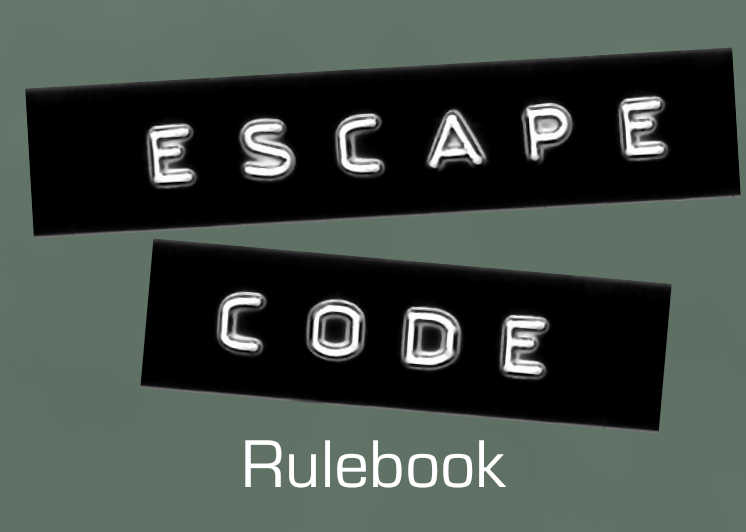
The main thing about the Cold War, amongst all the paranoia and the uncertainty and the information currency was just how many situations were just full of the misinformed stumbling backwards over one another. The true story of this era of human history is how we fluked into not ruining everything, and hopefully, can fluke into it again.
Here’s our story: A spy wants to return to base, to ‘come in from the cold.’ They have notified their contact; they have checked the radio station that gives them the keys and codes they can use to signal to their contact. But, the message has been intercepted, in parts, by multiple conflicting agencies.
The Agents have to catch the Spy, or the Contact, with a bullet. Problem is, if they catch one another, they’ve got a biiig problem.
Introduction
Access
To play Escape Code, you need some space players can place some cards for easy reference, close enough that when people have their eyes closed, nobody’s entirely sure who has been handling or manipulating cards. You will need to be able to communicate consistently with players in a common language.
Players don’t need to hold cards but they do need to remember a small number of words (no more than 4, most no more than 1).
What’s more, players are going to need to be talking about things to play the game, in a scenario. Be mindful of subjects that distress or bother other players. The game is no excuse to hurt people.
And always: Remember to respect the players and their needs.
Components
In your copy of GAME, you should have the following:
- 4 Code Reference Slot cards
- 24 ID Cards
- 24 Scenario Cards
How To Play
Escape Code is a hidden-information social deduction game where you’re trying to either sneakily drop a phrase into a conversation, or you’re trying to work out if someone is the spy. Unlike other games, this isn’t about trying to deduce rules of play based on how people have chosen to act – it’s about talking, about sharing a natural conversation, and about trying to work out who is secretly using words…
Oddly.
- If you’re one of the Agents or the Interceptor, you want to pull your gun on the Spy.
- If you’re the Spy, you want to say your escape phrase to the Contact.
- If you’re the Contact, you want to recognise the Escape phrase from the Spy only.
- If you’re the Civilian, you want the time to run out without anyone getting shot.
Setup
Take the four Codebook Key cards and set them in front of the players where they can be seen easily, in order, 1-4.
First things first, determine how many players you have. For larger groups, the game adds some roles to keep things spicy, and to minimise the number of code-words flying around.
Take all the ID cards face-up, and separate the ones that say YOU ARE from the remaining ones that say Code Word:.
From the YOU ARE cards, you need to select the following:
- The Contact Card
- The Spy Card
- If the game has more than seven players add the Civilian card
- If the game has more than nine players add the Interceptor card
Take the YOU ARE cards you need, and set them face-down in a stack. Then, take the CODE WORD cards, shuffle them face-down, and put a card on the stack until you have a number of cards equal to all the players.
Then, if you have only five players, turn the top card of the CODE WORD cards, and set it next to that stack.
Shuffle the stack, then deal out one card from it to each player. Each player looks at their card, and tries to remember what it tells them. If you only get a CODE WORD, you are an AGENT and you now know part of the code phrase the spy is trying to say.
Once everyone has read their cards, a player starts the Broadcast.
Each player puts their cards in the middle of the table where all players can reach them, face down. They have to remember what their card said: They don’t get to refer to it through the game. If there was a face-up Code Word, it is turned face down and added to this group of cards.
Then, all players close their eyes. One player needs to remember this speech, which gives instructions for players:
CONTACT, OPEN YOUR EYES AND LOOK AT THE CARDS. YOU HAVE TEN SECONDS.
Wait ten seconds.
CONTACT, CLOSE YOUR EYES. SPY, OPEN YOUR EYES AND LOOK AT THE CARDS. YOU HAVE FIVE SECONDS.
Wait five seconds.
SPY, PUT THE CARDS IN THE CODEBOOK KEY SLOTS FACE-DOWN. YOU HAVE TEN SECONDS.
Wait ten seconds.
SPY, CLOSE YOUR EYES.
EVERYONE, OPEN YOUR EYES.
Then, a player flips the top card of the Scenario deck – and setup is complete!
Play
Play is timed. Each round a total of ten minutes. Players are going to try and talk to one another as if they are at the Scenario as described.
The scenario shows where the players are meant to ‘be’ – the place where the contact and spy are expecting to meet one another, and where the Agents are going to try and blend in. Try to talk and act like you belong in this location, even if you’ve no idea what that means.
The scenario card also shows a sequence of numbers: These numbers are the order the Spy needs to say their code words. The Spy knows the code words, the contact knows the code words, but the Contact doesn’t necessarily know the right order for them, and the contact knows that all the other players know at least one of the words in the code phrase.
It’s important to act natural!
At any time, an Agent can pull their gun and point it at someone. Do this with a finger, don’t bring actual guns or gun-like things to the table, it’s untidy. When you point a gun at someone, the accused player has to disclose whether or not they’re the spy or the contact. But be careful! If you ever accuse an Agent or the Civilian, the game is over and the Agents lose!
Players are not allowed to discuss what their code card showed. They can use the word on it, but they can’t ever tell anyone that that word is on their card. If they do, they’ve breached protocol and their side loses.
If the spy ever tells anyone they’re the spy, they and the contact lose.
If the contact ever identifies someone as the Spy and is wrong, the Spy and the Contact lose.
If the Interceptor ever tells anyone they’re the interceptor or the spy, they lose.
If the Civilian ever tells anyone they know the code words, or what the words are, they lose.
Winning
At the end of the ten minutes, if the Agents haven’t identified a spy, they lose the game, and the spy and contact escape. They don’t lose but they don’t win either.
If the spy tells the contact the Escape Code, and the contact agrees with it, the game stops immediately. The spy and contact confirm to the other players the phrase that was said, and then, reveal all the face-down cards to see if the stated phrase was the correct phrase. If it’s the correct phrase, the spy and contact have successfully initiated an escape, and they win the game. If they got the phrase wrong, the contact and spy lose the game.
If the civilian is in the game, and nobody gets shot and the game ends, the civilian wins!
Credits
Game, Rulebook, Art: Talen Lee
Special Thanks
Agent Jeb
Agent Fox
